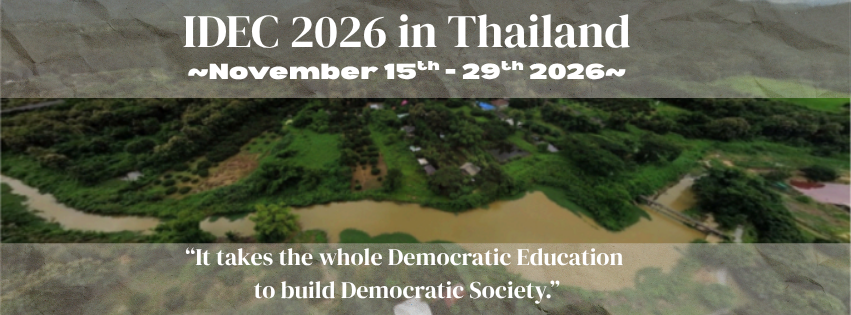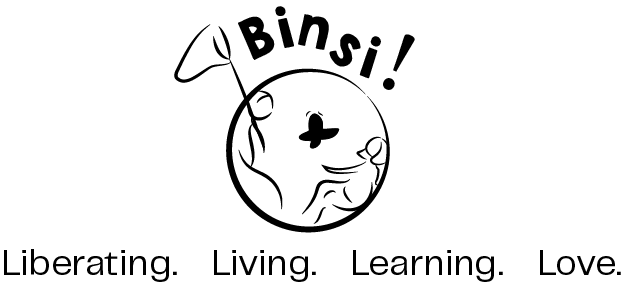What is IDEC
IDEC
The International Democratic Education Conference (IDEC) is a large-scale international conference collectively organized by students, parents, educators, advocates, scholars, organizational groups, and any individuals or organizations concerned with democratic education from around the world. Held annually, rotating among the five continents, IDEC is currently the most influential and indicative annual event in the global alternative education and homeschooling communities. Through discussions, brainstorming, and sharing, the conference strives to promote democratic education worldwide.
The History
In 1993, philosophers, professors, and politicians from four countries—Israel, Austria, the United Kingdom, and the United States—gathered in Jerusalem for a conference called “Democratic Education in a Multicultural Society.” Following this, a group of teachers and students from democratic schools were invited to Hadera for two days, where they enthusiastically discussed and shared their own experiences and ideas about education at the Democratic School of Hadera. In order to continue exploring, exchanging, and learning about democratic education, they decided to establish a forum, a platform, and an annual gathering. Since then, a school or organization has volunteered to host the conference each year, continuing up to the present.
The first four years of this conference were known as the Hadera Conference, driven by Yaccov Hect, David Gribble, and Jerry Mintz. Yaccov continuously raised funds for IDEC, while David sent out two to three newsletters each year. However, promoting through traditional mail was challenging. Eventually, Jerry Mintz provided a website that began to connect the flow of information on democratic education around the world.
IDEC : International Democratic Education Conference
IDEC, is not an organization, but over the years, it has gradually become a community with a cohesive energy, a large family.
The organization of IDEC varies each year, with each gathering being distinct and unique. Once the next host is jointly decided, they have the authority to determine the date, schedule, costs, accommodation, and format of the conference. The duration of the conference varies; for example, the first IDEC lasted only two days, while the 1997 conference lasted for 14 days.
Most participants are students from democratic schools. At the IDECs held in Sands School in the UK in 1997, in Tokyo in 2000, and in Berlin in 2005, the participants were almost all young people. If the conference lasts longer, there are usually some travel arrangements, school visits, or different social and cultural exchange activities. Sometimes the agenda during IDEC is pre-arranged with dialogues, speeches, or workshops, but most of the program is organized by the participants after the meeting starts.
In the early years of IDEC, the conference was smaller in scale, and all expenses were raised by the organizing unit. However, as the number of participants increased, user fees became the best method we have found so far. At the same time, the organizing unit also raises some funds to provide scholarships for participants who cannot afford to attend.
Vision
Through IDEC, participants from a plethora of different countries exchange ideas, build consensus, and form support networks to strive for world peace and friendship, though sharing the values and experiences of Demcratic Education.
Ensure that all ethnic groups in society, whether majority or minority, can retain their own culture, live happily, and respect each other.
Empower every student to think independently and learn responsibility.
Enable every individual to become truly complete, not swayed by others, and master of their own destiny.
It’s not just about becoming oneself, but an independent entity that knows how to live together with mutual understanding, consideration, and care.
In democratic education, every individual has the power to decide on matters, how to learn, when to learn, what to learn, where to learn, and with whom to learn.
The relationship between teachers and students is not hierarchical, and peers are not competitive but share and learn together.
Through school meetings students can discuss public issues, and learn to take responsibility for oneself, the environment, and society.
Participants
School Founders
Educators
Students
Parents
Administrative Officers
Researchers of Education
Anyone interested in Democratic Education
Features
Every Participant is also an Organizer of the annual conference.
Mutual respect, open space, flexible autonomy without rigid collective norms dictating what you should do or what activities you should join.
You can start a workshop anytime, anywhere, and invite everyone to join.
There is no right or wrong in asking questions; everyone can fully express their thoughts.
As long as you sincerely want to participate, regardless of age, occupation, language, skin color, etc., you have equal rights.
Activities and Events
Official Conference Duration:
The duration of the conference, planned by the organizing team, ranges from 2 to 15 days. The main activities include workshops with multiple sessions running concurrently, allowing participants to choose based on their interests. Keynote speeches are delivered by democratic education practitioners sharing real-life cases and academic research.
During the conference, any person can engage in any space and at any time in in-depth conversations about education, life, and personal experiences.
All participants have the option to set up a booth at the marketplace to showcase products unique to their countries, share their organization’s educational philosophy, and distribute promotional materials.
The theme of each year’s event is decided by the organizing team.
IDEC Night is an opportunity for any participant to perform and lead activities (games, choir singing, etc.) on stage.
The Annual Conference includes the IDEC public affairs decision-making mechanism, where anyone can participate. The meeting is facilitated by at least one, but not limited to one, moderator who handles all issues with a spirit of consensus and principles, including the selection of the host country for the next three years.
In-depth Exchange:
Special activities prepared by the host country’s organizing units include cultural tours, school visits, participation in educational seminars/expos/lectures, formal diplomatic dinner events, etc. These are planned by each year’s organizing team, and participants can choose their own desired itinerary.

Buy Tickets
Lorem ipsum dolor sit amet, consectetur adipiscing elit. Ut elit tellus, luctus nec ullamcorper mattis, pulvinar dapibus leo.
Official Website
Lorem ipsum dolor sit amet, consectetur adipiscing elit. Ut elit tellus, luctus nec ullamcorper mattis, pulvinar dapibus leo.
